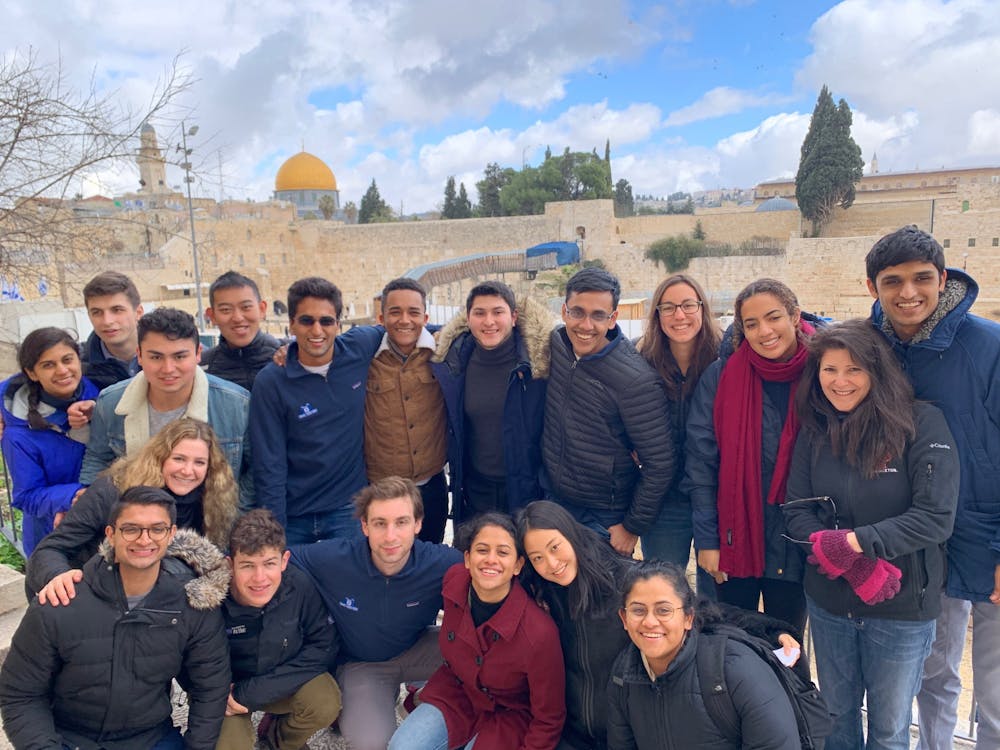Ron Miasnik ’22 and Daniella Cohen ’22 were just first-years when they realized what they had in common: a connection to Israel through family and faith, a deep interest in tech and startups, and a desire to travel.
It took them 18 months and surprisingly few obstacles. By Intersession 2020, they’d pieced together Princeton’s first international Tiger Trek, modeled on pre-existing New York City and Silicon Valley Tiger Treks. The weeklong trip offered 18 students and two chaperones the opportunity to travel to Israel in an attempt to understand how the country’s political climate, culture, and other institutions contribute to creating such an expansive tech ecosystem in such a small space.
Israel, which is approximately the size of New Jersey, boasts the highest number of startups per capita in the world. Participants spent the trip’s first four days in Tel Aviv, following a speaker-heavy program with a focus on understanding the ecosystem of the startup nation. The last three days took place in Jerusalem and were dedicated to giving the students a better understanding of Israel’s culture.
“All the students represented Princeton very well,” said Marni Blitz, a chaperone of the trip and the associate director of the Center for Jewish Life. “Every speaker remarked at how incredible their questions were. They had really done their homework and were prepared.”
Students met on three separate occasions before the trip to orient themselves with Israeli culture. On the trip itself, teams of students presented each speaker before he or she spoke to provide context and add depth to each conversation.
Daily meetings were spaced out, and a tour guide traveled with the group to help them understand Israel’s cultural context. The itinerary even included a visit to Yad Vashem, the World Holocaust Remembrance Center, with the hope of putting conversations about shared Israeli trauma into perspective.
One highlight of the trip, according to participants, was discussing life, business, marriage, investing, and startups with Michael Eisenberg, one of Israel’s top venture capitalists. After dinner with him on the first night, the group was invited for Shabbat dinner at his house later in the week. The dinner was one of three home-cooked meals the group enjoyed throughout their trip, with the other two hosted at Miasnik’s grandparents’ house and the home of Idit Harel, the founder and CEO of Globaloria, during a panel on female entrepreneurs.
Other speakers throughout the week included Hilla Ovil-Brenner, one of the first women to break into the Israeli high-tech industry, and Kira Radinsky, a mathematician and computer scientist with whom the group was able to reunite after the trip at a presentation titled “Learning to Predict the Future in Healthcare” on Feb. 10 at Princeton.
What problems did the organizers encounter when planning the trip’s first-ever run?
Short answer: none. Ron and Daniella struggled to recall any problems.
“There were no major logistical issues. We started working far in advance and were never in a rush,” the duo said. “We worked together very well and tried to perfect it as much as possible.”
The often tedious job of fundraising was made simpler, too, by the immediate interest of organizations such as the CJL, the Keller Center, the Princeton Entrepreneurship Council, departments such as computer science and mechanical and aerospace engineering, and alumni donors, both in the United States and in Israel. Due to their contributions, the trip became a cross-campus initiative and attracted a diverse body of applicants.

“For trips sponsored by the CJL, usually the number of applicants is two to three times the amount of spots available. This trip had six times the amount of applicants,” said Rabbi Julie Roth, the executive director of the CJL.
Roth applauded Ron and Daniella for their initiative, vision, and enthusiasm.
“I wasn’t sure how easy it would be for them to find the funding,” she continued. “I didn’t imagine it would be as phenomenal as it was because it was the first time. They hit an A+ across the board.”
Blitz seconded how remarkable the group was and commended how easily they adapted to the smallest of changes.
“The day we were supposed to go to the Old City, we couldn’t because of Trump’s Peace Plan release,” Blitz said. “We quickly made alternative plans and decided to go to the Dead Sea, which ended up being one of the highest-rated activities after an intense week of meetings. Then we visited the Old City the next day. Ron and Daniella had incredible patience and great communication.”
For the participants, apart from being a time to learn about startup culture, the trip was a time to learn about themselves. By the time the trip drew to a close, the students had bonded as a group.
“Family is important as a value in Israel,” said Ayushi Sinha ’20. “We were not only able to share our own family stories with one another on this trip, but we also learned how these values are instilled in Jewish culture and how they’re able to help foster a new generation of startup founders.”
The group hopes to continue the conversation about Israel’s startup ecosystem on Princeton’s campus. Some admit to leaving with more questions than answers, given the country’s complexities. They hope the trip will run as successfully in the future, which appears likely given the enthusiasm and support of its sponsors.








